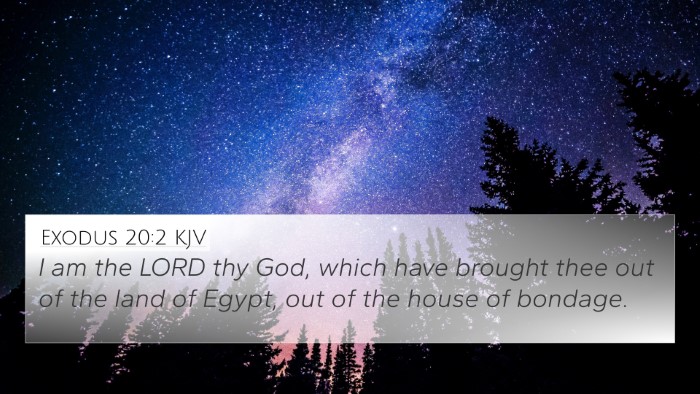Understanding Leviticus 22:33
Verse (Leviticus 22:33): "And you shall sanctify the name of your God: I am the Lord." This verse emphasizes the importance of honoring and revering God's name, a theme that is woven throughout the scripture.
Meaning and Interpretation
This verse presents a multifaceted reflection on the sanctity of God's name and the requirement for believers to set it apart in their lives and worship. The concept of sanctification, which involves making something holy or setting it apart, is critical here.
Commentary Insights
-
Matthew Henry: He notes that this command highlights the reverence that is due to God’s name. The name of the Lord should be treated with the utmost respect, reflecting God's holiness and power. Henry emphasizes that every action we take should glorify God and reinforce our commitment to His authority.
-
Albert Barnes: Barnes explores the context in which God gives this commandment. He states that the Israelites are reminded continually of their responsibilities to God, particularly in their offerings and sacrifices. This connection to their worship practices indicates that how they treat the name of God reflects their relationship with Him.
-
Adam Clarke: Clarke elaborates on the implications of sanctifying God’s name within the community. He explains that failure to do so could lead to a disregard for God's laws and an erosion of the moral fabric of society. The holistic understanding of this command underscores the importance of communal integrity and fear of God.
Bible Verse Cross-References
To deepen our understanding of Leviticus 22:33, we can look at the connections between Bible verses. Here are some pertinent cross-references:
- Exodus 20:7: "Thou shalt not take the name of the LORD thy God in vain; for the LORD will not hold him guiltless that taketh his name in vain." - This verse emphasizes the importance of honoring God's name and aligns with the call to sanctification in Leviticus 22:33.
- Psalms 30:4: "Sing unto the LORD, O ye saints of his, and give thanks at the remembrance of his holiness." - This verse underscores the act of sanctifying God's name through worship and remembrance.
- Ezekiel 36:20-23: "And when they entered unto the heathen, whither they went, they profaned my holy name…" - This passage speaks to the consequences of failing to uphold God's holiness among the nations.
- Matthew 6:9: "After this manner therefore pray ye: Our Father which art in heaven, Hallowed be thy name." - In the New Testament, Jesus acknowledges the sanctity of God's name in how we ought to address Him in prayer.
- 1 Peter 1:15-16: "But as he which hath called you is holy, so be ye holy in all manner of conversation; Because it is written, Be ye holy; for I am holy." - This passage reinforces the requirement for believers to reflect God's holiness in their lives.
- Isaiah 29:23: "But when he seeth his children, the work of mine hands, in the midst of him, they shall sanctify my name…" - God's people are expected to honor and sanctify His name through their actions and lineage.
- Romans 2:24: "For the name of God is blasphemed among the Gentiles through you, as it is written." - This New Testament reference brings to light how the actions of believers can impact the perception of God's name by the world.
Thematic Connections
The theme of sanctifying God's name connects individuals and communities throughout scripture, to understand their identity and covenant in relation to God.
This thematic analysis fosters a deeper appreciation for how interconnected Biblical texts are, encouraging believers to engage with scripture holistically through cross-referencing.
Using Cross-References Effectively
By exploring the links between these verses and others, one can develop a fuller understanding of God's expectations for holiness and reverence. Using tools for Bible cross-referencing, like a Bible concordance or online resources, can enhance your study.
Conclusion
Leviticus 22:33 serves as a reminder of the importance of revering the name of God. Through comparative analysis of related verses and comprehensive study methods, believers can understand better the weight of the commands that encourage sanctification and holiness in daily life.








